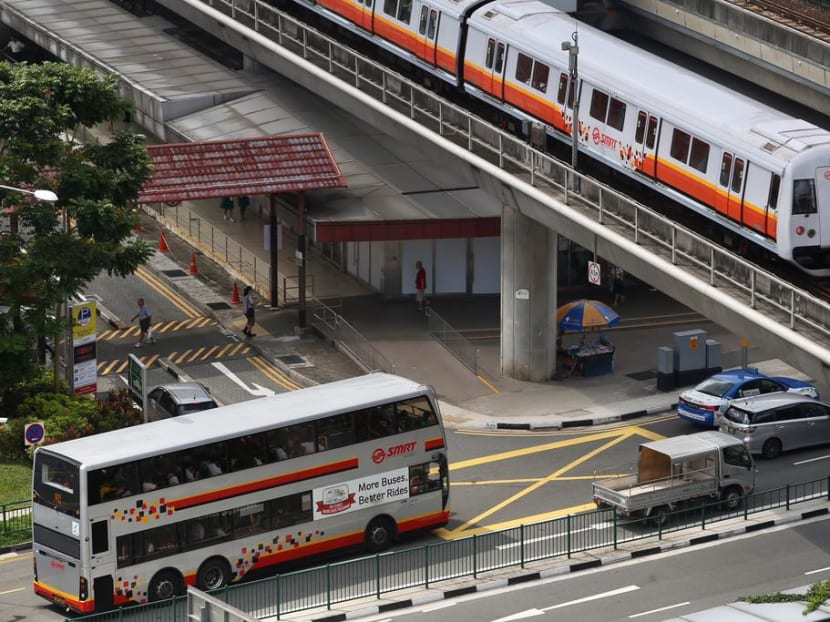Fares have to rise, operators must be more cost-efficient as taxpayers’ bill ‘cannot keep ballooning’: Ong Ye Kung
SINGAPORE — The Government will continue to subsidise rail and bus operations, but the bill to taxpayers “cannot keep ballooning”, Transport Minister Ong Ye Kung said on Friday (March 5).

Fare adjustments are needed because costs do go up, including the wages of public transport workers who look forward to earning more, Transport Minister Ong Ye Kung said.
- Fares are not enough to cover operating costs, Transport Minister Ong Ye Kung said
- Steps must be taken to manage the system’s long-term financial sustainability
- Bus and rail operators would have to find new ways to be cost-efficient
- Public transport fares will also have to be adjusted from time to time, he added
SINGAPORE — The Government will continue to subsidise rail and bus operations, but the bill to taxpayers “cannot keep ballooning”, Transport Minister Ong Ye Kung said on Friday (March 5).
Steps must be taken to manage the long-term financial sustainability of the public transport system, he said during a parliamentary debate on his ministry’s budget for the upcoming financial year.
This means that bus and rail operators would have to find new ways to be cost-efficient while keeping services reliable, and not try to penny-pinch on maintenance cost, thinking that this will translate to savings, Mr Ong added.
This would also mean that public transport fares will have to be adjusted from time to time.
Fare adjustments are needed because costs do go up, including the wages of public transport workers who look forward to earning more, he said.
The Government has been spending about S$1 billion a year to subsidise rail operations and another S$1 billion a year to subsidise bus operations, he pointed out.
“Train fares so far are not enough to cover these operating costs,” he said, adding that the situation is the same for buses.
“The Government needs to continue to subsidise the operations of the MRT and buses. We can’t run away from that. But the bill to taxpayers cannot keep ballooning. If it does, we would leave our future generations a growing financial burden.”
Other than adjusting fares and nudging operators, the Government will also try its best to cut excess capacity in the system, especially bus services that run parallel to new train lines as they come up.
If not, tens of millions of dollars in operating subsidies for each service every year would go towards running these buses, he said.
REVIEWING NEW RAIL FINANCING FRAMEWORK
On the Government’s part, Mr Ong said that it would “square the circle” by reviewing its financing framework for the Downtown Line, which is operated by SBS Transit.
The Government took over from SBS Transit the ownership and replacement of operating assets, trains and signalling systems for the line, and has been charging the operator a fixed fee for using these assets.
“It is like renting on the part of the operator,” he said.
Under this financing framework, SBS Transit still bears a significant commercial risk, given that it suffers losses if ridership is unhealthy and operating costs far exceeds fare revenue, he noted.
“This is not ideal, because as a public utility, public transport should be a more stable business."
He noted that the North-South, East-West, Circle and North East MRT lines are under “Version Two” of the financing framework, which reduces commercial volatility by having the Government cream off operators’ high profits and cushion big losses year to year.
The Thomson-East Coast Line is on a third version of the framework, which Mr Ong said is akin to a contracting model: The Government collects all fare revenue, bears all revenue risk and grants the operator a fee to run the line for the initial period when ridership is still not stable. The line, which has just three stations opened last year, is expected to be fully operational in 2024.
“Recognising that the (framework) has evolved over the years, we will review the arrangement for the Downtown Line, given that it is still on Version One, and this will be done with a view to ensure that the operator will run the line reliably, with high productivity, and that the line is sustainable,” he added.
MRT NETWORK DENSITY TO MATCH LONDON'S
Mr Ong reiterated his ministry’s goal for 75 per cent of peak-hour trips to be made using public transport by 2030 — up from 64 per cent now.
More than S$60 billion would be pumped in over this decade to expand and renew the rail network, he said.
This means that new stations or lines will open almost every year, so that by the early 2030s, Singapore’s MRT network density will match that of London and New York City.
From 230km today, there will be 360km rail lines by this target date.
From now till 2025: The rest of the Thomson-East Coast Line will open
By 2026: The two ends of the Circle Line – Harbourfront and Marina Bay – will be connected, closing the loop
By 2029: Construction of the Jurong Region Line will complete
In the 2030s: The Cross Island Line will open progressively
Mr Ong stressed that while the Ministry of Transport is taking steps to promote the adoption of electric vehicles among drivers, they are “at most a second-best solution” in creating a sustainable land transport system.
He announced on Thursday that Singapore will stop all new diesel car and taxi registrations from 2025, by which time eight towns will have charging points for electric vehicles at all Housing and Development Board car parks.
And, by 2030, all new car and taxi registrations must be of cleaner-energy models — including electric, hybrid and hydrogen fuel cell cars — to meet the country’s goal to phase out internal combustion engine vehicles by 2040.











